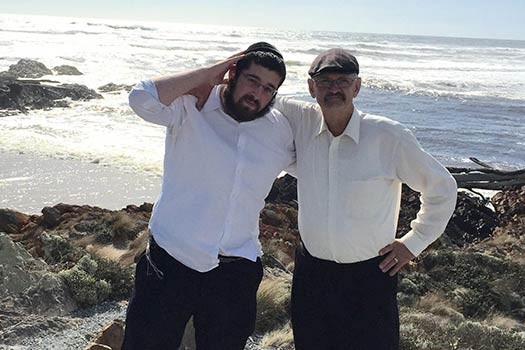
At ‘The Edge of the World,’ a Man Discovers a Hidden Identity
Dirk Evenhuis had come to northwestern Tasmania as a 5-year-old in 1951. His family was among 35 Dutch families who had emigrated together. It wasnt until a pair of Bochurim on Merkos Shlichus ‘found’ him that he redicovered his Jewish roots, literally at ‘the edge of the world’.
Before his death, Moses promised his people: “Even if your exiles are at the edge of the heavens, the L‑rd, your G‑d, will gather you from there, and He will take you from there.”
While the literal “edge of the heavens” may have yet to be reached by humankind, the place called “The Edge of the World” is found in the northwestern tip of Tasmania, from which oceans sweep unimpeded for 10,000 kilometers before reaching the eastern shore of Argentina.
And sure enough, the spot was a meeting place for a Jew who had only recently discovered his identity and a trio of senior rabbinical students from Sydney, who were traversing Tasmania, visiting its isolated Jews in coordination with Rabbi Yochanan and Rochel Gordon, co-directors Chabad of Tasmania in Newstead, Australia.
Dirk Evenhuis had come to northwestern Tasmania as a 5-year-old in 1951. His family was among 35 Dutch families who had emigrated together. His parents, Reinder and Hermina Evenhuis, had been part of the Dutch underground resistance during World War II, who had gathered intelligence for the British and even hid a German deserter in the walls of their home for years.
Scarred by the utter destruction of Europe at the hands of the Nazis, they remade their home in Tasmania. Like his father before him, Evenhuis the younger became a maker of processed meat, farming his own cattle, from which he produced his wares.
And, like his father, he felt a deep kinship with the Jewish people. In fact, he dedicated years of his life to traveling the world, telling people about G‑d’s special covenant with the Jewish people, one that could not be broken.
‘Among My Own People’
Evenhuis—who at one time had relocated to Melbourne to be closer to medical facilities his ailing wife needed—developed many connections with Jewish people, including a deep personal friendship with Rabbi Chaim Gutnick of Melbourne. He even once had afternoon tea with Israeli President Chaim Herzog in 1984.
“I remember telling my father how amazing it was,” recalls Evenhuis. “As soon as I came to Melbourne and met Jewish people, I felt like I was among my own people.”
After his wife’s passing in 2005, Evenhuis returned to his childhood hometown, alone and depressed.
One day in 2007, two Chabad-Lubavitch rabbinical students came to town. They made their rounds in the business district, asking if there were any Jews in the area. Everyone replied that there were none.
On their way back to their RV, they stopped an old woman with a trolley and inquired if, perhaps, they knew of any Jews. “Well,” she replied, “Dirk Evenhuis’s late mother was Jewish.”
Excitedly, they made their way to his home.
When they asked him about his mother’s identity, Evenhuis—who was raised in a devout Christian home—said he knew his mother had Jewish ancestry, but never knew her to be a Jewess.
He started inquiring among old friends of his late parents and learned that they had indeed confided to some of them that Hermina had been Jewish, a fact she chose to hide following their harrowing experience under Nazi rule. She had been rounded up more than once and only managed to survive through connections in the underground.
“Suddenly, things began to make sense,” says Evenhuis. “My mother had me circumcised as a baby, but never told me why I was different from all the other boys. It also explained why my mother had raven black hair, not a very Dutch feature.”
The pair invited him to spend Shabbat in Launceston with Rabbi Yossi Gordon, a weekend which he says he “enjoyed thoroughly.”
A Special Stop
In recent years, he has received yearly visits from the rabbi’s son Yochanan, who lives on the island and whom Evenhuis refers to as “my rabbi.” The young rabbi brings his own son and his kosher utensils along with him, and they all enjoy a meal of freshly caught fish together.
This past summer (which in Tasmania takes place from December to January), when the three rabbinical students came to visit at the rabbi’s behest, Evenhuis’s home was a stop on their itinerary.
“We were in Tasmania for a week,” says Foli Paris, who together with his peers serves as a shaliach (senior student) at the Yeshiva Gedola Rabbinical College of Sydney, “and we visited people all over. We could tell that some people—who live far from any established Jewish community—were really affected by the encounters. One woman told us that she would start lighting Shabbat candles every week, and another couple is considering keeping kosher.”
But perhaps one of the most memorable—and beautiful—moments will be their visit to “The Edge of the World” with a Jew, now nearly 70, whose identity came precariously close to being lost from the world forever.















Anonymous
Go Yosef Lewis and shmuley Hecht !
anonymous
GO FOLI !! WE ARE SO PROUD OF YOU!!
anonymous
awesome job foli!
anonymous
Foli nice picture good to see you bro!!
anonymous
REFAEL!!Zeir shein!!best bochur in lubavitch!!!
bochur Mendy
Foli,we miss you! Loved to hear you learn with Balei
Batim in Montreal. Learned a lot from you, your kind personality, dedication, and devotion was to be admired. May you continue to go from strength to strength.
go tasi
Grate work Yochanan and Rochel
Keep it up
/!!!!!!!!
BSR
Pholi from the best Of the best. Hatzlacha down there. Sure you will continue to be shining example wherever you are.
tassie people
the rebbe has great vision
One small candle
Let us light all those candles and chase away all the darkness of golus. Nice to read happy news for a change. Foli,you and your friends are amazing.
Remember the kindness you show to everyone you meet. Keep it up Foli!
A friend
Goldie Netz
This is beyond beautiful, meaningful and moving.
Thank you!!!!!!!!!!!!!
Keep up the great work chabad in tasmania.